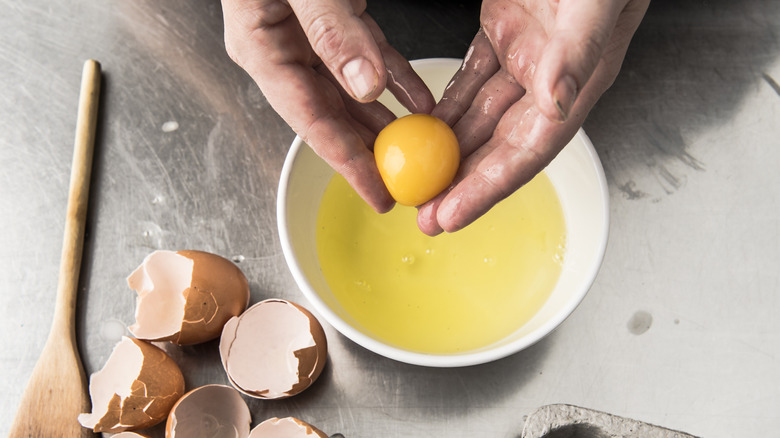
Manny Rodriguez/Getty Images
According to the Centers for Disease Control and Prevention, 35.5 million U.S. adults are living with chronic kidney disease (CKD), and 90% of those people aren’t even aware that they have it. If kidney disease is left untreated, it not only affects the kidney’s ability to properly remove waste from the body, but can also negatively affect your blood pressure too.
One of the ways you can help stave off kidney disease or give your kidneys a healthy boost if they do have problems is by eating foods that are specifically good for them. While there’s a whole slew of foods that are great for kidney health, you might be surprised to know that eggs should be on your list of go-to foods. It’s even recommended that people who suffer from kidney issues make egg whites a part of their daily diet.
“While each person with kidney disease must consult with their doctor for guidance on how much protein to consume, some studies have shown a nutritional benefit of consuming egg whites,” Jen Houchins, PhD, RD, Director of Nutrition Research at the American Egg Board’s Egg Nutrition Center, exclusively told Health Digest. Dr. Houchins noted a 2011 study in the Journal of Renal Care in which outpatient dialysis patients were given pasteurized liquid egg whites for one meal every day instead of meat. “Egg whites were incorporated into various recipes for six weeks,” said Dr. Houchins. “The participants in this pilot study had improved blood phosphorus and a slight improvement in blood protein levels.” As Dr. Houchins explained, other studies showed similar results with daily egg whites as their protein.
Is daily egg white consumption okay for everyone?

Maria Tebriaeva/Shutterstock
Although the aforementioned study proved that egg whites are beneficial for those with kidney problems, it doesn’t mean that everyone should immediately start eating egg whites every day. After all, each body is different, and because of this, what looks like a healthy diet for some can be problematic for others. “A patient’s doctor, in collaboration with a registered dietitian, can determine the frequency of egg white consumption for people with kidney disease,” said Dr. Houchins.
While 50 grams of egg whites offer the body five grams of high-quality protein with only 25 kilocalories and they’re low in sodium and have less than 1 carbohydrate, egg white consumption can come with side effects like allergies. Skipping the yolk could also lead to low levels of biotin, which is essential for healthy skin, hair, and nails. So in that case, you’ll need to get your biotin from other sources. Also, if you’re a vegetarian, yolks may be the only way your body is getting cholesterol – and believe it or not, we do need at least some cholesterol in our bodies. So, as Dr. Houchins advised, it’s always best to talk to your doctor before suddenly upending your diet with an onslaught of egg whites.
How the yolk affects the benefits of egg whites

Alexander Spatari/Getty Images
What’s important to realize is that, for the most part, eggs are really good for you. “Whole eggs, including the yolk, are a nutrient-rich option to incorporate into a healthy diet for kidney disease,” said Dr. Houchins. “Eggs provide 6% Daily Value of vitamin D and 252 micrograms of the carotenoids lutein plus zeaxanthin (dietary antioxidant and anti-inflammatory components), which may benefit patients with kidney disease.” So while eating the yolks with your whites, meaning the whole egg, definitely has its benefits, if you have high cholesterol, you want to eat them in moderation or, even better, talk to your doctor about what moderation means for your specific needs.
There’s also the issue of phosphorus being found in the yolk, as Dr. Hochins explained. Healthy kidneys are able to remove phosphorus from the blood when the levels get too high, but kidneys that have been affected by disease struggle to remove the excess phosphorus. When phosphorus is allowed to build up, it can deplete calcium from your bones, causing them to become weak and brittle, per the National Kidney Foundation. Phosphorus that has been left unchecked can also lead to calcium being deposited in places where it shouldn’t be, for example, the eyes, lungs, heart, and blood vessels. If this situation isn’t taken care of, you’re looking at increased risks of cardiovascular issues, as well as a stroke, and even possibly death. In other words, there is such a thing as too much a good thing, even when it’s deemed healthy.
Credit: healthdigest.com










